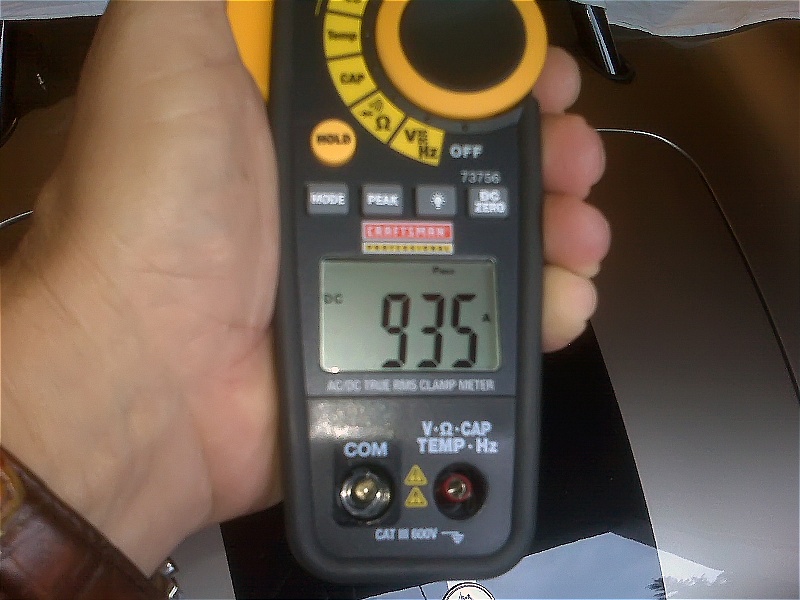 
 Main Menu
Main Menu
|
 Nevada Classics
Nevada Classics
|
 Advertise at CC
Advertise at CC
|
| S |
M |
T |
W |
T |
F |
S |
| |
|
|
1 |
2 |
3 |
4 |
| 5 |
6 |
7 |
8 |
9 |
10 |
11 |
| 12 |
13 |
14 |
15 |
16 |
17 |
18 |
| 19 |
20 |
21 |
22 |
23 |
24 |
25 |
| 26 |
27 |
28 |
29 |
30 |
31 |
|
|
 CC Advertisers
CC Advertisers
|
|
 9Likes 9Likes

03-27-2020, 08:43 PM
|
 |
CC Member

|
|
|
Join Date: Sep 2008
Location: Austin,
TX
Cobra Make, Engine: ERA FIA, 351W
Posts: 765
|
|

 Not Ranked
Not Ranked
 Ammeter Overcharging
Ammeter Overcharging
My ammeter shows +25 or higher when I start it up...I don't drive it very often so it kind of spikes when I first start it; after a while it's still +15-+25 though - worried that that is too high.
I added Holley Sniper fuel injection; when I did that the 40 amp alternator wasn't keeping up, i.e. was running at 11-12.5 volts, so I added a 100 amp; seems OK now as voltmeter shows a range of 13.4 to 14.2 volts ...
But wondering how I troubleshoot a high reading for the ammeter? Any suggestions? Is that range OK?
Thanks all.
|

03-28-2020, 08:56 AM
|
|
CC Member

|
|
|
Join Date: Apr 1999
Location: cleveland,
OH
Cobra Make, Engine: CSX4000, 427
Posts: 1,999
|
|

 Not Ranked
Not Ranked
I think as long as your voltage is within normal limits, it's fine.
The ammeter measures the direction and flow rate of electricity. After starting your car, the battery is being recharged after being drained, and as the car runs, the battery recharges, the value should decrease. If you normally have a battery charger on your car, then your battery should recover more quickly, if not, it will take longer to recharge, and the ammeter will still be at a higher level for a longer period of time.
Also, the value of the ammeter may be affected by how the ammeter is connected to the electrical system of the car.
Again, as long as your voltage is OK, then I think you are fine.
__________________
"After jumping into an early lead, Miles pitted for no reason. He let the entire field go by before re-entering the race. The crowd was jumping up and down as he stunned the Chevrolet drivers by easily passing the entire field to finish second behind MacDonald's other team Cobra. The Corvette people were completely demoralized."
Last edited by Anthony; 03-28-2020 at 08:57 AM..
Reason: dementia
|

03-28-2020, 09:45 AM
|
|
CC Member

|
|
|
Join Date: May 2006
Location: St. Louisville,
Oh
Cobra Make, Engine: A&C 67 427 cobra SB
Posts: 2,445
|
|

 Not Ranked
Not Ranked
I think 13.5 volts is normal, but 14.2 volts is too high. I suspect your voltage regulator is not working properly. High amps and high voltage is two meters telling you that your battery is getting cooked.
If the regulator is in the alternator, you would need to replace it or take it to a shop that will repair it.
If the regulator is located separately somewhere, I would first verify it has a good ground. I unmounted my ECU and a bolt was mounting both the voltage regulator and the ECU. It turned out the voltage regulator was grounding to the ECU. My voltage went to about 14.5. I ran a new ground wire to the voltage regulator and voltage returned to normal.
PS
If the regulator is in the alternator, I suppose there could be a ground issue at the alternator, if it is relying on the mounting bolts.
Last edited by olddog; 03-28-2020 at 09:49 AM..
Reason: PS
|

03-28-2020, 09:59 AM
|
 |
CC Member

|
|
|
Join Date: Sep 2008
Location: Austin,
TX
Cobra Make, Engine: ERA FIA, 351W
Posts: 765
|
|

 Not Ranked
Not Ranked
Really the volts don’t get in the 14s. Stays pretty close to 13.4. Do you agree with Anthony (thanks Anthony btw)
|

03-28-2020, 11:33 AM
|
 |
Half-Ass Member

|
|
|
Join Date: Jun 2005
Cobra Make, Engine: ERA #732, 428FE (447 CID), TKO600, Solid Flat Tappet Cam, Tons of Aluminum
Posts: 22,012
|
|

 Not Ranked
Not Ranked

Remember, your ammeter is measuring current. If your battery is fully charged, and you fire her up, it's perfectly normal to see 25 amps going through the meter for a couple of minutes as the battery recharges to full capacity. If you are still seeing greater than a few amps going through the meter after the car has been running a while, and your system voltage is a normal value of under 14ish volts, then you have to ask "where is the load on that side of the gauge?" Is there a high amp load (like a fancy audio system), or maybe an ignition system, maybe the fans, that are wired directly to the positive terminal of the battery? Or to a lug that is between the ammeter and the battery? Or maybe it's a poor connection that is creating heat -- just like a space heater. Or maybe it's the battery itself. Remember, you only have amps measuring on your gauge when you have current, and you only have current when you have a load of some sort. 99.9% of the time, there is less than a couple of amps running through your ammeter, and that's just to keep the battery trickle charging after it has been fully charged up.
|

03-28-2020, 12:28 PM
|
 |
CC Member

|
|
|
Join Date: Sep 2008
Location: Austin,
TX
Cobra Make, Engine: ERA FIA, 351W
Posts: 765
|
|

 Not Ranked
Not Ranked
patrickt,
Thanks; that's very helpful.
I need to check to see what is directly wired to the battery; the only thing that really changed is the holley efi and distributor - I didn't install it so I'll need to check it out.
but...
why/how does it matter if something is wired directly to the battery. In your example, i.e. a fancy audio system (in my case the electronic efi), if it's wired through the fuse box or wired directly through the battery (with an inline fuse), wouldn't the ammeter read out the same way regardless of the way it's wired?
Also, would you agree, assuming there are no poor connections, that as long as the system is producing the proper amount of volts, that a high ammeter reading is OK?
Thanks again.
|

03-28-2020, 01:14 PM
|
 |
Half-Ass Member

|
|
|
Join Date: Jun 2005
Cobra Make, Engine: ERA #732, 428FE (447 CID), TKO600, Solid Flat Tappet Cam, Tons of Aluminum
Posts: 22,012
|
|

 Not Ranked
Not Ranked
Quote:
Originally Posted by fastd

Also, would you agree, assuming there are no poor connections, that as long as the system is producing the proper amount of volts, that a high ammeter reading is OK?
|
Only after the reason 25 amps running though the ammeter was explained. Where is that 25 amps going? My ammeter shows about 20 amps after I've started it up, with a little bit of cranking, but moves back to less than 5 after it's run a bit. Car ammeters have been the same for 100 years. It's only when somebody wires a load to the battery side of the gauge that the readings get funky. |

03-28-2020, 01:18 PM
|
 |
Half-Ass Member

|
|
|
Join Date: Jun 2005
Cobra Make, Engine: ERA #732, 428FE (447 CID), TKO600, Solid Flat Tappet Cam, Tons of Aluminum
Posts: 22,012
|
|

 Not Ranked
Not Ranked
Quote:
Originally Posted by fastd

why/how does it matter if something is wired directly to the battery. In your example, i.e. a fancy audio system (in my case the electronic efi), if it's wired through the fuse box or wired directly through the battery (with an inline fuse), wouldn't the ammeter read out the same way regardless of the way it's wired?
|
Let's put a 200 watt bulb on the positive and negative terminal of the battery. Remember watts equals volts times amps, so it's going to draw about 15 amps or so. When the car starts up, the alternator will serve up the amps needed to charge the battery back up plus that 15 amps. All of that will go through the ammeter. When the battery is charged, the ammeter should ease back down to 15 amps plus a little extra for the battery. If you move the bulb over to the other side of the ammeter, the alternator will still serve it, but the current will not pass through the ammeter. |

03-28-2020, 01:25 PM
|
 |
Half-Ass Member

|
|
|
Join Date: Jun 2005
Cobra Make, Engine: ERA #732, 428FE (447 CID), TKO600, Solid Flat Tappet Cam, Tons of Aluminum
Posts: 22,012
|
|

 Not Ranked
Not Ranked
Conversely, let's wire a 1,000 watt bulb (80 amps) right off the alternator of my car. I start the car up, turn the light bulb on, my alternator serves up the 60 amps that is all it's got, and my battery supplements the needed extra 20 amps, so my ammeter shows I'm discharging by 20 amps. My battery will soon be dead. If I wired that light bulb right to the battery, my ammeter would show that I was charging to the tune of 60 amps but my battery would still be dead pretty soon.
|

03-28-2020, 01:41 PM
|
|
CC Member

|
|
|
Join Date: Aug 2000
Location: Pinellas Park,
FL
Cobra Make, Engine: built the molds and body composite construction
Posts: 318
|
|

 Not Ranked
Not Ranked
Check the water level of your battery, if you are cooking it, the level should be going down, if it's down add and then see if it goes down or remains the same. BE VERY CAREFUL around the battery, if you are cooking it, it will be putting out a lot of explosive gas and a spark will set it off. Saw one blow the top of the battery off sending acid all over, be care full.
BillK
|

03-28-2020, 02:31 PM
|
|
CC Member

|
|
|
Join Date: Aug 2007
Location: Carlsbad,
Ca
Cobra Make, Engine: SPF 2932 with 438 Lykins Motorsports engine. Previous owner of FFR 5452.
Posts: 2,616
|
|

 Not Ranked
Not Ranked
Put a charger on your battery and bring it to full charge. Then check your ammeter reading. Should be just to the right of the zero mark after a few miles. Sounds like your battery has run down due to inactivity.
__________________
Jim
|

03-28-2020, 03:34 PM
|
 |
Senior Club Cobra Member

|
|
|
Join Date: Jul 2000
Location: Chilliwack,BC,
BC
Cobra Make, Engine: F5 Roadster
Posts: 1,422
|
|

 Not Ranked
Not Ranked
 voltage
voltage
Modern alternators are set at 14.1 to 14.4 volts charging.
Perry 
__________________
F5 cobra Mark 4 roadster, **SOLD** Ruby Wine Red with pearl,
dual 2" roll bars, warmed up 302, Edelbrock AVS carb and heads, E Street aluminum Heads, Comp cam and roller rockers, AOD, 4.10 Eaton Posi, Power Baer/disc brakes, block hugger headers, 2 1/2" under car exhaust, F500 18" black spoke wheels.
|

03-28-2020, 04:13 PM
|
 |
CC Member

|
|
|
Join Date: Apr 2009
Location: Little Rock area,
AR
Cobra Make, Engine: ERA Street Roadster #782 with 459 cu in FE KC engine, toploader, 3.31
Posts: 4,527
|
|

 Not Ranked
Not Ranked
Quote:
Originally Posted by HighPlainsDrifter

Modern alternators are set at 14.1 to 14.4 volts charging.
Perry  |
Thatís my experience too. My 17 Shelby charges 14 to 14.6 volts on the digital display. My 67 GTX charges around 14.5 on an analog gauge as near as I can make out. |

03-29-2020, 07:31 AM
|
 |
CC Member

|
|
|
Join Date: Sep 2008
Location: Austin,
TX
Cobra Make, Engine: ERA FIA, 351W
Posts: 765
|
|

 Not Ranked
Not Ranked
Quote:
Originally Posted by patrickt

Conversely, let's wire a 1,000 watt bulb (80 amps) right off the alternator of my car. I start the car up, turn the light bulb on, my alternator serves up the 60 amps that is all it's got, and my battery supplements the needed extra 20 amps, so my ammeter shows I'm discharging by 20 amps. My battery will soon be dead. If I wired that light bulb right to the battery, my ammeter would show that I was charging to the tune of 60 amps but my battery would still be dead pretty soon.
|
Got it. Thank you. Super helpful.
My Holley efi wiring schematic shows that power should come directly from the battery so thatís probably where my funkiness is coming from. |

03-29-2020, 08:08 AM
|
 |
Half-Ass Member

|
|
|
Join Date: Jun 2005
Cobra Make, Engine: ERA #732, 428FE (447 CID), TKO600, Solid Flat Tappet Cam, Tons of Aluminum
Posts: 22,012
|
|

 Not Ranked
Not Ranked

Quote:
Originally Posted by fastd

Got it. Thank you. Super helpful.
My Holley efi wiring schematic shows that power should come directly from the battery so thatís probably where my funkiness is coming from.
|
I Googled Holley EFI amp draw and did not get a simple straightforward spec on what its number was, but I did see that it came with a 40 amp fuse on it, so it's definitely pulling something. If you wanted to know exactly, you would use an inductive amp meter, like mine pictured below. You just clamp it around the wire while the load is running and *poof* you've got your answer, just like magic. This pic was from a thread here where people were musing what the initial in-rush current of an FE stock starter motor draws (which is why it goes through a solenoid) and it is about as high as your battery can serve up, for a moment at least, as it sets up the field in the electric motor. Note that my starter motor draws, for a moment, over 900 amps. While it's cranking it draws over 200, as I recall.
 |

03-29-2020, 08:19 AM
|
 |
CC Member

|
|
|
Join Date: Sep 2008
Location: Austin,
TX
Cobra Make, Engine: ERA FIA, 351W
Posts: 765
|
|

 Not Ranked
Not Ranked
Yes. Need to get one of those.
Will call Holley tomorrow to see what they say it draws and ask about wiring alternatives. Thanks again.
|

03-29-2020, 08:22 AM
|
 |
Half-Ass Member

|
|
|
Join Date: Jun 2005
Cobra Make, Engine: ERA #732, 428FE (447 CID), TKO600, Solid Flat Tappet Cam, Tons of Aluminum
Posts: 22,012
|
|

 Not Ranked
Not Ranked
Quote:
Originally Posted by fastd

Yes. Need to get one of those.
Will call Holley tomorrow to see what they say it draws and ask about wiring alternatives. Thanks again.
|
And if the guy says "I think it draws twenty or so amps" then you've got your answer, and your system is behaving normally. |

03-29-2020, 09:20 AM
|
|
CC Member

|
|
|
Join Date: Apr 1999
Location: cleveland,
OH
Cobra Make, Engine: CSX4000, 427
Posts: 1,999
|
|

 Not Ranked
Not Ranked
Maybe , if you turn your ignition on without starting the car, and take an ammeter reading. Then, pull the fuse on your FI system, including the fuel pump, and again turn your ignition on without starting the engine, and take a reading, the difference may be the current draw from the fuel injection system.
__________________
"After jumping into an early lead, Miles pitted for no reason. He let the entire field go by before re-entering the race. The crowd was jumping up and down as he stunned the Chevrolet drivers by easily passing the entire field to finish second behind MacDonald's other team Cobra. The Corvette people were completely demoralized."
|

03-29-2020, 02:36 PM
|
 |
CC Member

|
|
|
Join Date: Mar 2006
Location: San Marcos california,
CA
Cobra Make, Engine: 1989 KCC from South Africa Right Hand Drive
Posts: 1,605
|
|

 Not Ranked
Not Ranked
With that much current draw, I would take the Ammeter out of the circuit entirely. At this rate its going to overheat and be a fire hazard.
Don't forget , all that current runs through the Ammeter and those thin wires.
Also. If it came with a 40 amp fuse, I hope you have a relay in that circuit too.
Last edited by CHANMADD; 03-29-2020 at 02:40 PM..
|

03-29-2020, 04:52 PM
|
 |
Half-Ass Member

|
|
|
Join Date: Jun 2005
Cobra Make, Engine: ERA #732, 428FE (447 CID), TKO600, Solid Flat Tappet Cam, Tons of Aluminum
Posts: 22,012
|
|

 Not Ranked
Not Ranked

Quote:
Originally Posted by CHANMADD

With that much current draw, I would take the Ammeter out of the circuit entirely. At this rate its going to overheat and be a fire hazard.
|
Or run a parallel wire with the ammeter circuit. I have a 12 gauge parallel wire with my ammeter circuit and it does two things: 1) It mutes the heavy draws of current when my fans come on, that used to send the needle all the way over to the left where it would get stuck, and 2) it dynamically re-routes current around the ammeter (which I really like) should the ammeter start to overheat. The ammeter still registers correctly, the readings are simply reduced. They don't, of course, reduce past the zero mark and give you an incorrect direction of current.  But, it pretty much eliminates the possibility of the ammeter overheating because, as the ammeter heats up because of a failure, it creates additional resistance in that leg of the circuit and current will then just go down the parallel path (that's just Ohm's Law). Think of it like having two parallel wires, of equal gauge, running to a 120 watt light bulb, which will draw roughly ten amps. All things being equal, each wire would have five amps on it. On one of those two wires you have a 20 amp fuse, and on the other wire you have a one amp fuse. You will not blow the one amp fuse because, as the filament heats up, the resistance increases and the current then passes through the other wire.  |
 Posting Rules
Posting Rules
|
You may not post new threads
You may not post replies
You may not post attachments
You may not edit your posts
HTML code is Off
|
|
|
All times are GMT -7. The time now is 10:02 PM.
Links monetized by VigLink
|


